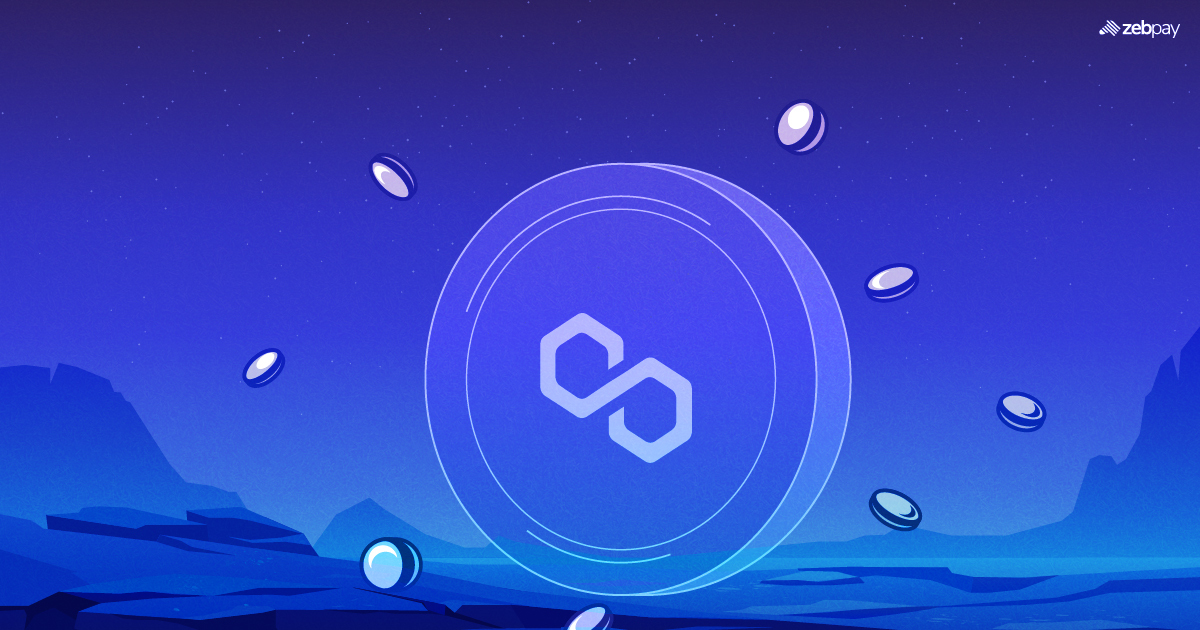The Ethereum blockchain is the innovation pioneer in crypto due to Smart contract technology and decentralized applications (dApps). However, it faces three significant challenges: high transaction fees, limited tools for developers, and low throughput.
Polygon (MATIC) is a decentralized scaling solution that employs parallel blockchains or sidechains to facilitate faster and cheaper transactions. This feature enables developers to build scalable and secure dApps. Some of its key features include:
- High throughput: Polygon can reach up to 7,000 TPS (transactions per second) and create many side chains for horizontal scaling.
- Availability: Crypto transactions are cheap, quick, and secure on Polygon side chains. Transactions are recorded on the mainchain, and Ethereum is generally used as a Layer 1 base chain.
- Security: Users or operators of polygon chains are also stakers in its proof-of-stake (PoS) consensus system.
- Public side chains: Unlike other individual chains, Polygon side chains are permissionless and open to the public.
There are numerous benefits to using the Polygon blockchain, making it an attractive option for developers. Users can take advantage of this faster, cheaper, and scalable blockchain. It also offers a high level of security and a supportive community. Let us look at some of the other benefits of Polygon contributing to its rise in the crypto landscape.
Enhanced Scalability and Throughput
The Polygon network can achieve high scalability to support large users and transactions. It uses a modified version of Plasma and the PoS consensus system to achieve scale. It can process more crypto transactions quickly and cheaply, unlike other conventional blockchains. Polygon is a good choice, especially for decentralized applications that process large transaction volumes.
Polygon can achieve a higher transaction rate per second than the Ethereum network. As Polygon operates on top of Ethereum as a layer-2 scaling solution, it can reach up to 7,000 TPS, whereas Ethereum can only manage up to 45 TPS. Developers look at various factors, such as decentralization, interoperability, and security, when selecting a blockchain platform for their use. Scalability is another feature that is valuable for developers these days. Polygon can achieve enhanced scalability, which makes it appealing for dApps that require low costs and quick transactions.
Lower Transaction Costs
Polygon processes most transactions off-chain, resulting in low costs and quick transactions. Lower transaction costs can improve accessibility for users and developers. You can cost-effectively and easily deploy a wide range of dApps using the Polygon network. The average cost per transaction in Polygon is about $0.015. This transaction fee is significantly lower than Ethereum’s.
Interoperability and Cross-Chain Compatibility
The creators of Polygon have ensured interoperability with other blockchains to enable smooth transfers of crypto assets and other transactions across various platforms. It is easy to integrate Polygon with multiple blockchains. Its APIs and SDKs (software development kits) make it easy to integrate with other blockchains.
Crypto bridging refers to moving tokens between networks cheaply and quickly. Bridging crypto assets can solve issues like low network speed, high fees, and scalability. The Polygon bridge is used for cross-chain transactions between Polygon and other blockchain platforms. It enables users to transfer crypto tokens and NFTs to its sidechain through Smart contracts. It is designed to connect with other blockchains easily, and users can transfer their crypto assets back and forth. Polygon enhances the Ethereum ecosystem through its innovative tools to build scalable dApps.
Decentralized Finance (DeFi) Advancements
As discussed earlier, low transaction costs and enhanced scalability are some of the vital features of Polygon. These features have greatly benefited the decentralized finance (DeFi) market and many DeFi projects are migrating to Polygon. Settling digital payments fast is vital for dApps, and Polygon offers real-time payment settlement, making it an ideal choice for DeFi apps.
Polygon can speed up payment settlements using its innovative APIs and SDKs. It evaluates credit ratings by analyzing the entire transaction ratings of its users, which can be a beneficial tool for DeFi services. Many lending applications have emerged using the Polygon network, such as Ovix, Aave, and ARCx. It has risen to become a top competitor to conventional blockchains such as BSC and Ethereum.
One of the significant advantages of DeFi is its potential to promote financial inclusion in developing regions. Traditional financial institutions often exclude large segments of the population from their programs and packages. DeFi can provide access to financial services such as lending, borrowing, and trading to the unbanked. DeFi platforms like Polygon can help unbanked individuals access these services to participate in the global economy.
Read More about The Future Of Polygon
NFT Ecosystem and Digital Collectibles
Polygon NFTs are minted on its blockchain or bridged from another crypto platform. NFTs benefit immensely from the low gas costs and quick transaction speeds of the Polygon network. The Polygon NFT ecosystem is thriving with platforms such as NFT marketplaces, digital art platforms, NFT-based DeFi platforms, and gaming platforms. It is home to teams such as the HellCats and gaming projects such as Arc8 and Benji Bananas. It also consists of popular NFT marketplaces such as OpenSea, and over 800 million NFTs have been minted on the Polygon network.
It is easy and cheap to mint NFTs using the Polygon protocol. It has NFT creation tools, such as Mint, that allow users to create NFTs in just a few minutes. The Mint NFT tool offers APIs for developers to create a seamless minting experience for their users. Gaming platforms can leverage the SDK to create in-game assets. Polygon NFTs can transform vital industries such as real estate, music, and gaming.
Play-to-Earn Gaming
Polygon is the leading crypto platform for Ethereum scaling, expanding into NFTs and play-to-earn (P2E) gaming. The NFT and DeFi spaces have made a big impact, with play-to-earn emerging as the next big disruptor. Play-to-earn (P2E) is exactly what it sounds like gamers can earn revenue through video games.
Polygon offers a scalable platform for P2E gaming to enable low-cost and fast transactions for various in-game assets and experiences. Earlier this year, Polygon became the second-largest crypto gaming network in terms of unique active wallets (UAWs). Close to 138,000 UAWs were engaging with Polygon gaming applications. Some popular Polygon games include Metawin, Sunflower Land, Hunters On Chain, and Benji Bananas. Let us look at some advantages of using Polygon for P2E gaming.
- The Polygon network offers low transaction fees.
- The Polygon network is compatible with the Ethereum virtual machine (EVM).
- It employs a variation of the PoS consensus system where validators are constantly contributing to make the platform more secure.
- It has an established community with over 20K dApps.
- It has integrated with established NFT marketplaces such as OpenSea.
- It fully supports established crypto token standards such as ERC-1155, ERC-20, and ERC-721.
Community Governance

The Polygon team has plans to create a new governance framework that allows for more decentralization. This development is in response to their new roadmap, Polygon 2.0, where they are building a network of zero-knowledge layer-2 chains. The new governance system will create three governance pillars: community treasury governance, core protocol governance, and Smart contract governance. In its blog post, Polygon stated that it will take inspiration from Ethereum’s governance system to assimilate its ethos and other community-building strategies. Other key features of the new governance model include the Polygon Improvement Proposal (PIP), community treasury governance to fund promising projects, and an ecosystem council for Smart contract upgrades.
Environmental Sustainability
Sustainability has grown in prominence over the last few years, and more companies are striving to reduce their carbon footprints. Crypto sustainability refers to an environmentally friendly approach when dealing with crypto assets. Polygon has committed itself to sustainability by promoting the decentralized and renewable nature of the crypto infrastructure. It is working towards integrating sustainability into its processes, such as cloud technology, energy-efficient computing parts, and distributed ledgers. It released a green manifesto last year in which it committed to going carbon-negative and investing $20 million in green projects. It has positioned itself as an environment-friendly startup by going remote and has further committed to cutting down on Scope 3 emissions, sources of CO2 outside of network operations.
Collaboration and Partnerships
The Polygon network has risen to become one of the top crypto service providers and partnered with many top-tier brands. Companies like Starbucks, Adobe, and Coca-Cola have partnered with Polygon to launch their NFTs. Let us look at some of the significant Polygon collaborations:
Adobe
Adobe launched Behance in 2005 as a platform for developers and creators to showcase their work. It has a massive active user base and is preparing to transition into an NFT marketplace to support its NFT artists. It will collaborate with the polygon network to list its NFTs and scale its reach.
Starbucks
Starbucks has partnered with Polygon to start an NFT loyalty program called Starbucks Odyssey.
Adidas and Prada
Polygon has also collaborated with lifestyle and fashion brands such as Prada and Adidas to create NFT marketplaces. It will facilitate purchasing NFTs using the OpenSea platform.
Future Outlook and Potential
Polygon can solve many issues faced by the Ethereum blockchain by offering low-cost and quick transactions while maintaining high levels of decentralization and security. Its ecosystem has unique dApps such as play-to-earn games, DEXs, and NFT marketplaces. Developers and users are increasingly adopting Polygon, with many dApps transitioning to its platform.
Polygon is actively exploring new avenues of development using DeFi apps and NFTs. It has a DeFi aggregator platform called PolyDeFi that enables users to engage with multiple DeFi protocols. This platform has gained significant traction, and new DeFi protocols are eagerly awaited. Many media platforms and NFT marketplaces are joining the network to leverage its low transaction fees and fast transaction speeds.
Conclusion: Unlocking the Benefits of Polygon (MATIC)
This article has explored the various benefits of the Polygon network, such as low transaction fees, enhanced scalability, interoperability, NFT, and gaming ecosystems. We have also seen its commitment to becoming environment-friendly through various initiatives, such as the Green Manifesto. It is working towards becoming a highly sustainable blockchain, making it attractive for users and developers who want to create more environmentally friendly crypto assets and applications. It has also collaborated with several top-tier brands and is actively looking for partners to expand its reach. It provides an effective platform for many applications due to its interoperability, security, and scalability. Polygon will play a vital role in shaping the blockchain landscape of the future.
To stay up to date with the latest crypto news, visit ZebPay blogs. Click on the button below to trade on ZebPay.
FAQ’s on Benefits of Matic
What are the advantages of using Polygon compared to other blockchain platforms?
Polygon is more scalable, interoperable, and offers low-cost transactions when compared to other blockchains.
How does Polygon improve scalability and transaction speed?
Polygon improves scalability and high transaction speeds due to its modified version of Plasma and the PoS consensus system.
How does Polygon facilitate interoperability between different blockchains?
Polygon’s APIs and SDKs (software development kits) make it easy to integrate with other blockchains.
What are the benefits of Polygon’s contributions to the DeFi ecosystem?
Settling digital payments fast is vital for dApps, and Polygon offers real-time payment settlement, making it an ideal choice for DeFi apps. It can help unbanked individuals access financial services to participate in the global economy.

